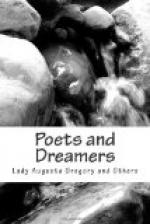II.
Irish history having been forbidden in schools, has been, to a great extent, learned from Raftery’s poems by the people of Mayo, where he was born, and of Galway, where he spent his later years. It is hard to say where history ends in them and religion and politics begin; for history, religion, and politics grow on one stem in Ireland, an eternal trefoil. ‘He was a great historian,’ it is said; ’for every book he’d get hold of, he’d get it read out to him.’ And a neighbour tells me: ’He used to stop with my uncle that was a hedge schoolmaster in those times in Ballylee, and that was very fond of drink; and when he was drunk, he’d take his clothes off, and run naked through the country. But at evening he’d open the school; and the neighbours that would be working all day would gather in to him, and he’d teach them through the night; and there Raftery would be in the middle of them.’ His chief historical poem is the ‘Talk with the Bush,’ of over three hundred lines. Many of the people can repeat it, or a part of it, and some possess it in manuscript. The bush, a forerunner of the ‘Talking Oak’ or the ’Father of the Forest,’ gives its recollections, which go back to the times of the Firbolgs, the Tuatha De Danaan, ‘without heart, without humanity’; the Sons of the Gael; the heroic Fianna, who ’would never put more than one man to fight against one’; Cuchulain ’of the Grey Sword, that broke every gap’; till at last it comes to ’O’Rourke’s wife that brought a blow to Ireland’: for it was on her account the English were first called in. Then come the crimes of the English, made redder by the crime of Martin Luther. Henry VIII ’turned his back on God and denied his first wife.’ Elizabeth ’routed the bishops and the Irish Church. James and Charles laid sharp scourges on Ireland.... Then Cromwell and his hosts swept through Ireland, cutting before him all he could. He gave estates and lands to Cromwellians, and he put those that had a right to them on mountains.’ Whenever he brings history into his poems, the same strings are touched. ’At the great judgment, Cromwell will be hiding, and O’Neill in the corner. And I think if William can manage it at all, he won’t stand his ground against Sarsfield.’ And a moral often comes at the end, such as: ’Don’t be without courage, but join together; God is stronger than the Cromwellians, and the cards may turn yet.’
For Raftery had lived through the ’98 Rebellion, and the struggle for Catholic Emancipation; and he saw the Tithe War, and the Repeal movement; and it is natural that his poems, like those of the poets before him, should reflect the desire of his people for ’the mayntenance of their own lewde libertye,’ that had troubled Spenser in his time.
Here are some verses from his ‘Cuis da ple,’ ‘cause to plead,’ composed at the time of the Tithe War:—




